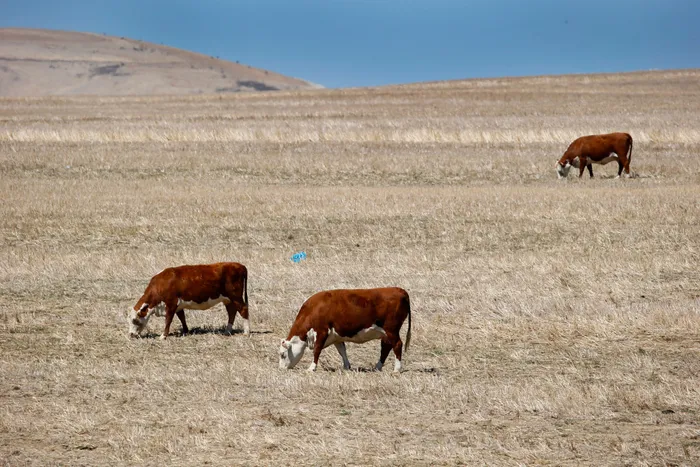Fixing South Africa’s broken foot and mouth disease prevention system

Recent foot and mouth outbreaks, most notably in Limpopo, KwaZulu-Natal, and parts of the Free State, have exposed the fragility of South Africa’s disease control systems, says the author.
Image: File
South Africa’s red meat industry is a cornerstone of the rural economy, particularly for emerging and communal livestock farmers. Yet, their aspirations - and the broader goals of inclusive growth outlined in the Agriculture and Agro-processing Master Plan (AAMP) - are persistently undermined by a recurring threat: foot and mouth disease (FMD).
Recent FMD outbreaks, most notably in Limpopo, KwaZulu-Natal, and parts of the Free State, have exposed the fragility of South Africa’s disease control systems. The economic fallout is staggering. Export bans, movement restrictions, and culling have cost the country billions in trade revenue, while simultaneously crippling market access for smallholder producers. For emerging farmers, who are already navigating structural disadvantages in the meat value chain, the disruption is not just economic - it’s existential.
FMD is not a new disease in South Africa. Its re-emergence in recent years points to a deeper issue: the slow erosion of our veterinary services, biosecurity infrastructure, and governance accountability. National and provincial departments of agriculture continue to operate in silos, under-resourced and under-coordinated. This has bred a patchwork approach to FMD prevention, leaving gaps that the virus exploits.
Broken Fences, Broken Systems
A recurring concern is the porous fencing along the disease control zones bordering Kruger National Park and other nature reserves, such as Hluhluwe in KwaZulu-Natal - where wild buffalo, a known FMD reservoir, come into contact with livestock. Decades-old promises to rehabilitate and maintain these fences have not materialised, due to bureaucratic inertia and budget constraints. This is emblematic of a broader problem: systemic underinvestment in animal health infrastructure, especially in communal areas.
Equally troubling is the inconsistency in livestock movement controls. While regulations exist on paper, enforcement is uneven and sometimes absent in practice. Livestock auctions and informal sales continue with limited oversight, creating ideal conditions for disease spread. In emerging farming areas, where veterinary services are sparse or non-existent, producers are left with neither the information nor the tools to prevent infection.
The Cost of Complacency
The consequences extend far beyond the farm gate. South Africa’s red meat exports - valued at over R4 billion annually - are at constant risk of suspension. In 2019, China and several Gulf countries imposed bans on South African meat imports due to FMD outbreaks. These bans not only hurt commercial producers but also eliminate potential pathways for small-scale farmers to access lucrative international markets.
Meanwhile, the AAMP, which envisions a transformed and inclusive meat sector, is rendered impotent when disease outbreaks lock emerging producers out of formal markets. Without market access, efforts to increase participation of black farmers in the red meat value chain remain tokenistic.
Time for a Rethink
Fixing this broken system requires more than reactive containment. We need a proactive, well-resourced, and decentralised animal health strategy. This starts with investing in the capacity and reach of veterinary services in rural and communal areas. Mobile veterinary units, supported by adequately staffed district offices, must become standard. Furthermore, the restoration of South Africa’s capacity to produce its own animal vaccines and attendant medicines cannot be overemphasised and is more urgent.
We must also rethink disease surveillance. Leveraging digital tools such as geo-tagging and SMS-based early warning systems can empower farmers with real-time information. Incentivising compliance through cooperative schemes and insurance mechanisms would make adherence to disease protocols more attractive to smallholders.
Crucially, the state must deliver on long-overdue infrastructure investments - especially rehabilitating and maintaining disease control fencing. Public-private partnerships, involving commercial livestock players and commodity organisations, could unlock resources while promoting shared responsibility.
The Political Will to Act
South Africa has the technical expertise and policy frameworks to combat FMD. What’s missing is the political will to act decisively, consistently, and inclusively. Disease outbreaks are not acts of God - they are failures of governance. If the AAMP is to be more than a paper plan, then securing animal health, especially for the most vulnerable producers, must become a national priority.

Dr Thulasizwe Mkhabela is an Honorary Research Fellow with the African Centre for Food Security and the University of KwaZulu-Natal
Image: LinkedIn
Dr Thulasizwe Mkhabela is an Honorary Research Fellow with the African Centre for Food Security and the University of KwaZulu-Natal ([email protected]) and an independent agricultural researcher and policy analyst. He is also a director and Senior Researcher at Outcome Mapping ([email protected]; [email protected]). Dr Mkhabela is also a Food, Agriculture, and Natural Resources Policy Analysis Network (FANRPAN) associate.
The views expressed here do not necessarily represent those of Independent Media or IOL
BUSINESS REPORT